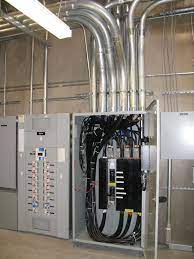Depending on the length of the power outage and the weather, it can also be harmful because food can rot and be thrown out. In addition, during the summer and winter, your home’s air temp can become alarmingly hot or cold. What happens if your home’s power is out for days? You might want to relocate till it returns.
On the other hand, a generator can power your entire home until the electrical system is restored. Because the electric grid never went out, run all of your household essentials, including the heating element, lights, and refrigerator, on low power. When fixing a whole-house generator, one frequent question is what it costs. This guide covers all of the costs associated with installing a whole-house generator. So, if you’re planning to put one in your home, make sure you read to the conclusion.
What size generator do you need?
Calculate the size necessary for a house using the watt used for generators below.
- Standby generators with a capacity of 20 kW can power an entire house.
- When combined with a sensible load manager, semi 16 to 20 kW generators can power essential appliances, such as air, conditioning, or perhaps an entire building.
- Portable generators with 10 to 15 kW power output can power up to ten lights and several appliances.
- A 4 kW generator powers an RV.
- According to Misha Kollontai, the Consumer Reports engineer in charge of generator testing, you should think about the items you need to power and total their wattages to estimate the generator size required. However, he cautions against spending more money on a portable generator than you need for such products.
Generator Dimensions
Of course, the size of the generator is determined by your daily power usage. The process begins with a visit from the site engineer to your home before purchasing. The team will assess the type of system in your home and examine to see if it has a good pump, a good water heater, a decent proportion of lights, and home appliances.
If you live in an average-sized house and only need to power one large item at a time, a smaller generator will suffice. Make a list of what devices, lights, and heating and cooling systems you’ll need if the power goes out. Add up all the watts to figure out what size you’ll need during a power outage.
Generator’s fuel type
You’d like to run your standby generator with natural gas, propane, or readily available fuel. This fuel can be stored in large tanks. Portable generators, on either hand, require diesel or gasoline, and you’ll have to buy a lesser amount of fuel each time you use the generator.
Daily generator running cost calculation
You can use a solar-powered generator if you want a portable solution but don’t want to store liquid fuel. It functions uniquely, keeping the battery charged for future usage. Different generators possess different advantages and disadvantages. However, keep in mind that the cost and availability of fuel should be the primary factors in your decision.
Generator Installation
In general, the generator installation location is determined by the location of the home circuit panel. The circuit panel will be connected to the generator and the transfer switch, located below. Generators are usually placed outside the house, a few meters away from the breaker. You were allowed to relocate the fuel source a few feet in one direction to make it convenient.
Electrical modifications or upgrades
The battery
You can power a few gadgets and lights with a battery generator. However, using it in conjunction with a power generator can allow you to run various small appliances or charge your phones. In contrast, the portable generator is used to operate your HVAC system and other large devices.
Monitor
Want to stay up to date on the status of your backup generator while you’re away? Investing in a remote monitor might be the best choice for you. This will notify you if the generator is operating while away from home during a power outage.
Read More: How To Get Rid Of Ants In Dishwasher? Why Ants Come There?
Load Manager with Intelligence
Consider employing a clever load manager if your generator isn’t up to the task. It will prioritize the regions powered by the generator and allow you to switch if necessary.
Whole-house generator installation costs
1: The price of installing a generator unit
The typical cost of installing the whole generator is $5000, but it can go up to $11000 if it is complicated. People typically pay between $5000 and $6000.
2: Cost of a Whole-House Generator
A whole-house generator requires $5000 and $60000 to install, such as the converter ($1000) and other supplies. Setup, delivery, and connection to the electrical panel & fuel supply are all included in this price. The transfer switch is kept inside, while the rest of the work is done outside.
3: The cost of installing a transfer switch
The transfer switch is installed indoors and costs $1800 and $2800. The installation of a transfer switch necessitates opening a wall, which may be reopened again for future maintenance.
4: Maintenance Kits for Generators
Generators regularly require maintenance, including oil and filter replacements, to guarantee maximum performance and reliability. Preventative maintenance packages range in price from $20 to $110. Annual generator service contracts range from $200 to $650 and include a complete inspection and oil filter changes.
Is it possible to run a house with a portable generator?
Switchgear or interlocking kit connects portable generators to an apartment’s electrical panel. For outages of less than two days, the generator can power lights and necessary appliances. On the other hand, portable generators are unable to power HVAC equipment and delicate gadgets.
How long do generators last?
A standby generator can last 15 – 20 years and provide 10,000 or 30,000 hours of service with regular maintenance. Portable generators can last up to ten years and produce electricity for 2,000 to 5,000 hours. Whole-house generators come with 5- to multiyear limited warranties from reputable brands.
Advantages of Whole House Generator
- Power Reliability: A whole-house generator provides a constant and reliable power source, ensuring that your home and its contents are protected during a power outage.
- Convenience: A whole-house generator eliminates the need to switch on portable generators and move them around, making it a convenient solution for providing power during outages.
- Peace of Mind: A whole house generator provides peace of mind, knowing that you and your family can access power during emergencies and natural disasters.
Disadvantages of Whole House Generator
- Cost: Installing a whole-house generator can be expensive, requiring purchasing and installing the necessary electrical systems.
- Maintenance: Whole house generators require regular maintenance and upkeep to continue functioning properly, which can be costly over time.
- Noise: Whole house generators can be loud when operating, which can concern some homeowners.
FAQs
Apart from this, if you are interested to know more about how to Paint Plywood Walls Effectively then visit our Home Improvement category.




